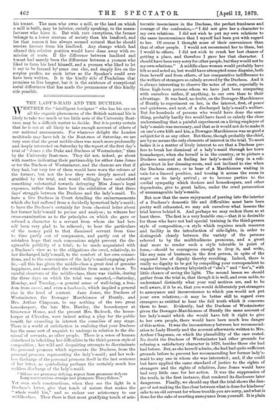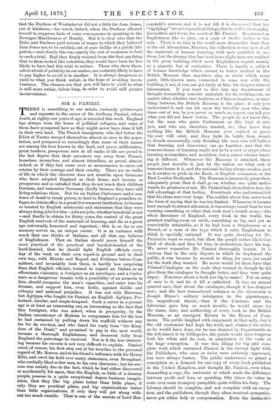THE LADY'S-MAID AND THE DUCHESS.
WHETHER the "intelligent foreigner" who has his eye on all the organic phenomena of the British national life is likely to take too much or too little note of the University Boat- race, may be a difficult matter to decide. But it is pretty certain that he is not at all likely to take enough account of others of our national amusements. For whatever delight the London multitude may have felt in the Boat-race of Saturday, we are very sure that the great middle-class was much more profoundly and deeply interested on Saturday by the report of the first day's trial of "Jones v. the Duke and Duchess of Westminster," than by the University Boat-race. They did not, indeed, go about with rosettes indicating their partisanship for either Jane Jones or for the Duchess of Westminster, and the chances are that if they had, but very few of them would have worn the colours of the former; but not the less they were deeply moved and gratified by the trial, and would willingly have subscribed something substantial towards defraying Miss Jones's legal expenses, rather than have lost the exhibition of that three days' struggle between the Duchess and the lady's-maid. To have a live Duchess in Court detailing the embarrassments which she had suffered from a decidedly hysterical lady's-maid; to have the Duchess's certainly far from classical letter about her former lady's-maid to peruse and analyse; to witness her cross-examination as to the principles on which she gave or refused a character to a servant from whom she had her- self been very glad to be relieved ; to hear the particulars of the money paid to that dismissed servant from time to time partly out of compassion, and partly out of the mistaken hope that such concessions might prevent the dis- agreeable publicity of a trial; to be made acquainted with a Duchess's view as to the obligations she owed, relatively, to her discharged lady's-maid, to the comfort of her own connec- tions, and to the convenience of the lady's-maid-engaging pub- lic,—all this has given the middle-class a great deal of genuine happiness, and smoothed the wrinkles from many a brow. To careful observers of the middle-class, there was visible, during the three days on which the trial was reported,—Saturday, Monday, and Tuesday,—a general sense of well-being, a free- dom from ennui, and even a bonhomie, which implied a general rise in the level of content. Jane Jones, the Duchess of Westminster, the Dowager Marchioness of Huntly, and Mrs. Arthur Chapman, to say nothing of the two great housekeepers, the late Mrs. Hawley, the housekeeper at Grosvenor House, and the present Mrs. Bacleock, the house- keeper at Cliveden, were indeed acting a play for the public
benefit far exceeding in interest the comedies of any stage. There is a world of satisfaction in realising that your Duchess has the same sort of anguish to undergo in relation to the dis- missal of servants, as other people. There is a sense of human sisterhood in beholding her difficulties in the third-person style of composition ; her wild and despairing attempts to discriminate the personal pronoun which represents the Duchess, from the personal pronoun representing the lady's-maid ; and her reck- less discharge of the personal pronoun itself in the last sentence of her letter, as symbolising perhaps the certainly much less reckless discharge of the lady's-maid.
"Bid me not grammar defying, repeat from grammar defyors Long constructions strange and plusquam Thucydidean."
Yet even such constructions, when they see the light in a Duchess's letter, give that touch of nature that makes the "whole world kin," and so endear our aristocracy to our middle-class. Then there is that most gratifying touch of aris-
tocratic insouciance in the Duchess, the perfect frankness and courage of the confession,—" I did not give her a character to my own relations. I did not wish to put my own relations to the same inconvenience that I myself had been put with regard to her. Of course I thought more of their convenience than that of other people. I would not recommend her to them, but I would to others. I did not wish to crush her last chance of getting a place, and therefore I gave her that character. I should have been very sorry for other people, butthey would not be my own relations." A middle-class woman would probably have felt so and acted so, but would have attempted some disguise, both from herself and from others, of her comparative indifference to the welfare of strangers so calmly avowed by the Duchess. And it is always interesting to observe the notes of caste, especially in these high-born persons whom we have just been comparing with ourselves rather, if anything, to our own than to their advantage. It was hard, no doubt, on the Dowager-Marchioness of Huntly to experiment on her, in the interest, first, of peace and quietness, and next, of a discharged lady's-maid's welfare. But for hundreds of persons who would have done the same thing, probably hardly five would have faced so calmly the clear understanding that a painful experiment on a living employer of lady's-maids was necessary, and. that as it would not do to make it on one's own kith and kin, a Dowager-Marchioness was as good a subject for it as any other. But these, though probably the chief, are by no means the only elements of interest in the trial. To most ladies it is a matter of lively interest to see that a Duchess pre- fers to break her dismissal of a lady's-maid through her town housekeeper, when she herself is in the country, or to picture a Duchess annoyed at finding her lady's-maid deep in a reli- gions tract in her dressing-room, and not inclined to rise when the Duchess enters ; or to hear of a Marchioness waiting in vain for a linseed poultice, and tossing it across the room in anger on its tardy arrival ; or to become parties to the cordial sympathy which doctors and housekeepers, and other dependents, give to great ladies, under the creel persecution of unmanageable lady's-maids.
But now that the mere enjoyment of peering into the interior of a Duchess's domestic life and difficulties must have been pretty well exhausted, we may ask ourselves what lessons the trial leaves behind it. And perhaps we may reckon them as at least three. The first is a very humble one,—that it is desirable for those who have not had special training in the third-person style of composition,—a style which requires much resource and facility in the introduction of side-lights, in order to distinguish clearly between the variety of the persons referred to by the multitudinous pronouns, and. a great deal more to render such a style tolerable in point of form,—should be courageous enough to drop it, and write, like any man of business, in the first person, in spite of the supposed loss of dignity thereby resulting. Indeed, there is really no dignity to be got by compelling your correspondent to wander through a thorny labyrinth of " she's " and " her's," with little chance of seeing the light. The second lesson we should gather from the trial is, that though it is well, and even noble, to understand distinctly what your real motives are, and to be well aware, if it be so, that you would deliberately put strangers to annoyance and inconvenience to which you would not put your own relations,—it may be better still to regard even strangers as entitled to hear the full truth which it concerns them to hear. Evidently, had the Duchess of Westminster given the Dowager-Marchioness of Huntly the same account of her lady's-maid which she would have felt it night to give to her own people, there would have been much less danger of this action. It was the inconsistency between her recommend- ation to Lady Huntly and the account afterwards written to Mrs. Arthur Chapman, on which the plausibility of the case rested. No doubt the Duchess of Westminster had other grounds for refusing a satisfactory character in 1876, besides those she had had before. But, as she herself admits, she had had quite sufficient grounds before to prevent her recommending her former lady's- maid to any one in whom she was interested ; and, if she could but have applied the same standard of justice to the rights of strangers and the rights of relatives, Jane Jones would have had very little case for her action. It was the suppression of the truth, in the first instance, that rendered its disclosure later dangerous. Finally, we should say that the trial shows the dan- ger of not making the line clear between what is done for kindness' sake to an old servant for whose trouble you are sorry, and what is done for the sake of averting annoyance from yourself. It is plain
that the Duchess of Westminster did not a little for Jane Jones, out of kindness,—too much, indeed., when the Duchess allowed herself to suppress facts of some consequence in speaking to the Dowager-Marchioness of Huntly. But it is clear also that the Duke and Duchess paid arrears of wages to which they believed Jane Jones not to be entitled, out of pure dislike of a public liti- gation,—and. clearly this was exactly the sort of weakness to lead. to such a trial. Had. they firmly resisted from the first anything that to them looked like extortion, they would have been far less likely to have had this trial to endure. Those who show them- selves afraid of publicity in one matter, are certainly likely to have to pay higher to avoid it in another. It is always dangerous to yield. to what you think unfair, in the hope of avoiding incon- venience. The chances are that you will have to yield to what is still more unfair, before long, in order to avoid still greater inconvenience.



































 Previous page
Previous page